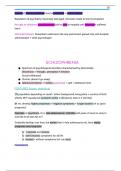26
Breach of ethical guidelines may be justifiable in public interest
Reputation of psychiatry irreversibly damaged: clinicians made to feel incompetent
No right to withdraw: pseudopatients told to stay in hospital until released + suffered
harm
Informed consent: Rosenhan’s admission the only permission gained only with hospital
administrator + chief psychologist
SCHIZOPHRENIA
● Spectrum of psychological disorders characterized by abnormality :
- Distortions of thought, perception + emotion
- Social withdrawal
● Chronic (doesn’t go away)
● Altered perception of reality (psychosis) = split / shattered mind
FEATURES (types, statistics)
1% population depending on racial / ethnic background, living place + country of birth:
affects M+F equally but symptom earlier in M (teens), later in F (20-30s)
M: mL develop higher proportion of negative symptoms + longer duration of sz (poor
prognosis)
Episodes of psychosis of sz: late adolescence - mid-30s with peak of onset in early to
mid-20s in M, late 20s in F
Gradually develop over time, but earlier than in late adolescence mL have worse
prognosis over long-term
- ¼ : 1 episode and recover
- ¼ : don’t recover, symptoms for all life
- ½ : treated = without symptoms but can recur
PROGNOSIS
, 27
Hard to predict course of illness
- 20% respond well to treatment
- Large % remain chronically ill, require regular treatment + support interventions
OTHER FEATURES
● Cognitive functioning deficits in working memory, language functioning + speed
of information processing
● Mood abnormalities: periods of low mood similar to those in depressive
episodes ; inappropriate displays of mood for no reason
SYMPTOMS (bhvs +thoughts)
Positive / Type I (add experience of patient to world) :
➢ HALLUCINATIONS: perception of external stimulus without any actual stimulus
present when awake + conscious in any sensory modality
➢ DELUSIONS (false ideas convinced to be true that cannot be changed by others
even where clear evidence demonstrated that challenges belief)
- Paranoia / persecutory: watching / want to hurt you
- Grandeur: having remarkable qualities
- Referential: certain bhvs / language from others being directed at them
personally
- Identity: you’re someone else
- Thought insertion: thoughts not your own and implanted in your mind by external
force over which they have no control
➢ DISORGANISED THOUGHTS (“loosening of associations”) where speech:
- Tangential: jump to another topic at random / on loosest of associations as
unable to make connections btw thoughts, unrelated answers to Qs
- Highly circumstantial: speak continuously, irrelevant details, no point
➢ ABNORMAL MOTOR / GROSSLY DISORGANISED BHV: severely affects ability to
cope with daily life; not expected in situation / changes rapidly out of control
- Catatonia: significant decrease in responsiveness to environment
Negative / Type II ( take away from experience of world, lost element of normal
functioning) :
● ALOGIA: speech problems / inability to speak
, 28
● AFFECTIVE FLATTENING: diminished emotional expression (less emotion in
general use of non-verbal communication like facial expressions, eye contact +
physical gestures); numbness
● AVOLITION: lack of motivation to usual + self-motivated activities
● ANHEDONIA: inability to feel pleasure
● ASOCIALITY: social withdrawal
Cognitive deficits (loss of mental ability) :
● Memory loss (amnesia)
● Attention (distraction)
● Planning
● Decision making
DIAGNOSIS
DSM-5: schizophrenia spectrum disorders = range of symptoms not fixed but change
over time
ICD-10: F20
1) Paranoid : later, +ve symptoms
2) Hebephrenic (disorganised): earlier, confusion
3) Catatonic: motionless + silent
4) Undifferentiated: mixture of symptom of other types
5) Simple: only -ve symptoms
6) Residual: low +ve symptoms, but psychotic ones / non-psychotic with -ve
symptoms
ICD-10: 2+ key symptoms present fo high proportion of last month with at least 1 is
delusions, hallucinations, disorganised thinking / speech / bhv or catatonia, -ve
symptoms
DSM-5: 2 from delusions, hallucinations, disorganised speech +bhv, dysfunction for 6
months = fewer False +ve but mL False -ve
Psychotic episode: (+ve) symptoms severe + prevent normal functioning
Main symptoms: hallucinations, delusions, confused + disturbed thoughts, lack of
insight (can’t tell their bhv is inappropriate)




